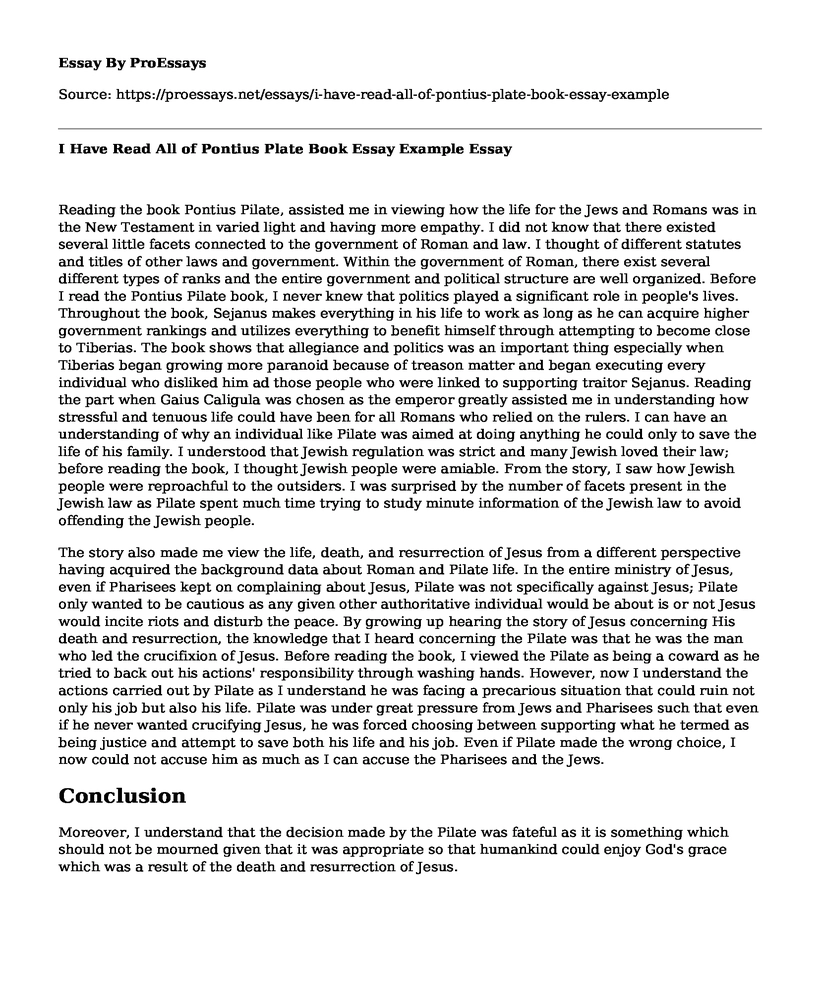Reading the book Pontius Pilate, assisted me in viewing how the life for the Jews and Romans was in the New Testament in varied light and having more empathy. I did not know that there existed several little facets connected to the government of Roman and law. I thought of different statutes and titles of other laws and government. Within the government of Roman, there exist several different types of ranks and the entire government and political structure are well organized. Before I read the Pontius Pilate book, I never knew that politics played a significant role in people's lives. Throughout the book, Sejanus makes everything in his life to work as long as he can acquire higher government rankings and utilizes everything to benefit himself through attempting to become close to Tiberias. The book shows that allegiance and politics was an important thing especially when Tiberias began growing more paranoid because of treason matter and began executing every individual who disliked him ad those people who were linked to supporting traitor Sejanus. Reading the part when Gaius Caligula was chosen as the emperor greatly assisted me in understanding how stressful and tenuous life could have been for all Romans who relied on the rulers. I can have an understanding of why an individual like Pilate was aimed at doing anything he could only to save the life of his family. I understood that Jewish regulation was strict and many Jewish loved their law; before reading the book, I thought Jewish people were amiable. From the story, I saw how Jewish people were reproachful to the outsiders. I was surprised by the number of facets present in the Jewish law as Pilate spent much time trying to study minute information of the Jewish law to avoid offending the Jewish people.
The story also made me view the life, death, and resurrection of Jesus from a different perspective having acquired the background data about Roman and Pilate life. In the entire ministry of Jesus, even if Pharisees kept on complaining about Jesus, Pilate was not specifically against Jesus; Pilate only wanted to be cautious as any given other authoritative individual would be about is or not Jesus would incite riots and disturb the peace. By growing up hearing the story of Jesus concerning His death and resurrection, the knowledge that I heard concerning the Pilate was that he was the man who led the crucifixion of Jesus. Before reading the book, I viewed the Pilate as being a coward as he tried to back out his actions' responsibility through washing hands. However, now I understand the actions carried out by Pilate as I understand he was facing a precarious situation that could ruin not only his job but also his life. Pilate was under great pressure from Jews and Pharisees such that even if he never wanted crucifying Jesus, he was forced choosing between supporting what he termed as being justice and attempt to save both his life and his job. Even if Pilate made the wrong choice, I now could not accuse him as much as I can accuse the Pharisees and the Jews.
Conclusion
Moreover, I understand that the decision made by the Pilate was fateful as it is something which should not be mourned given that it was appropriate so that humankind could enjoy God's grace which was a result of the death and resurrection of Jesus.
Cite this page
I Have Read All of Pontius Plate Book Essay Example. (2022, Nov 09). Retrieved from https://proessays.net/essays/i-have-read-all-of-pontius-plate-book-essay-example
If you are the original author of this essay and no longer wish to have it published on the ProEssays website, please click below to request its removal:
- Change, Growth, and Development of Wing Biddlebaum/Adolph Myer and Kacem
- Edgar Poe's, His Work and the Influence on the Literary World
- The Poem "Adulthood" by Nikki Giovanni Essay
- Alice in Wonderland and Through the Looking Glass Essay Example
- Literary Analysis Essay on Connection Between Gender and Class in Respectable Woman by Kate Chopin
- Criticism and Analysis of Hamlet
- Reflection on the Movie 12 Angry Men







